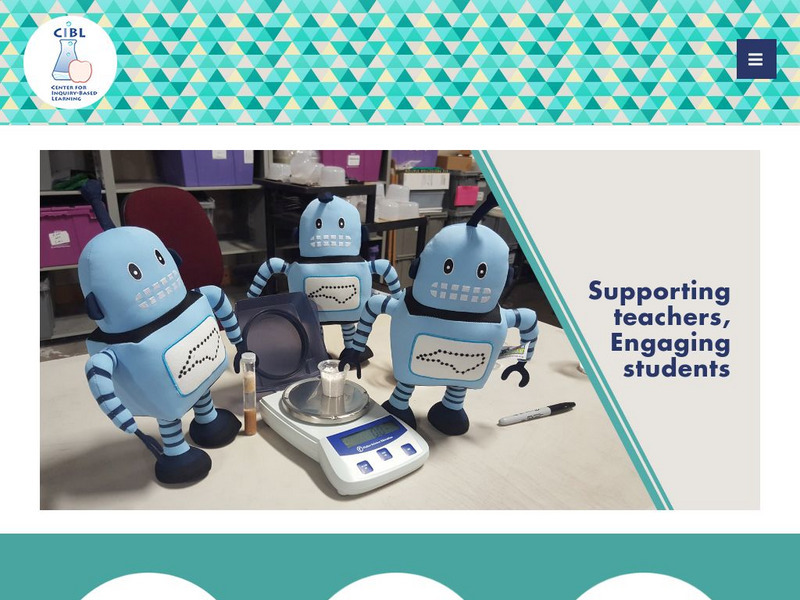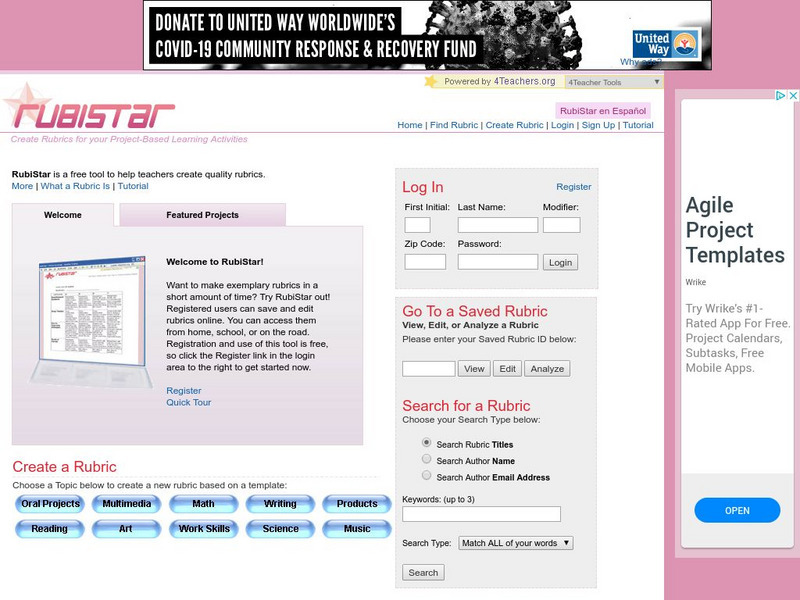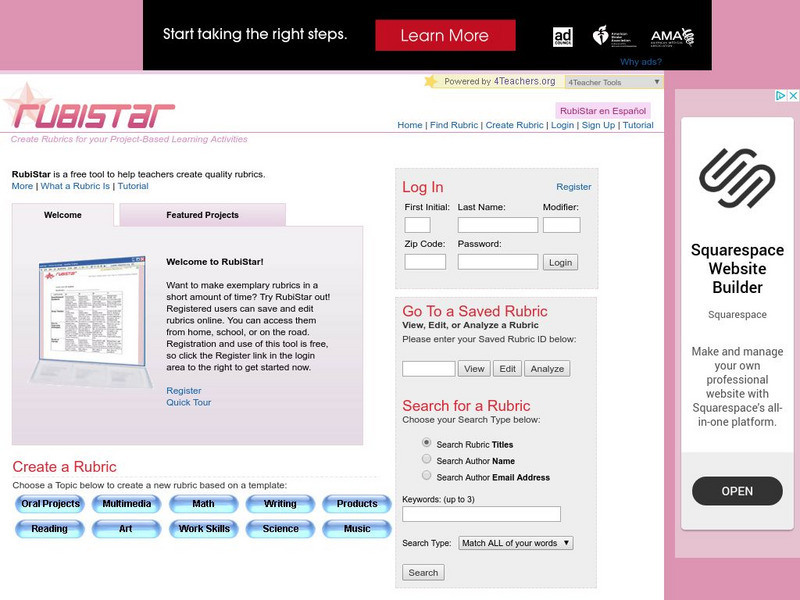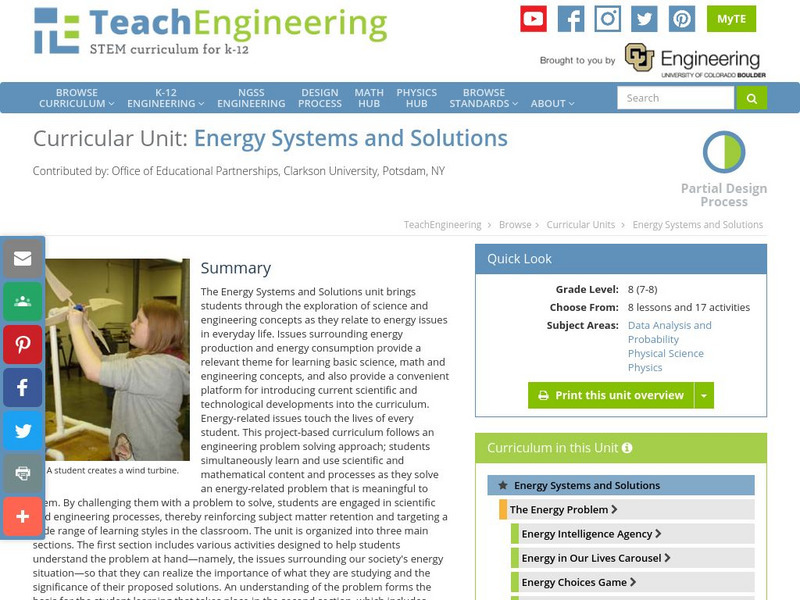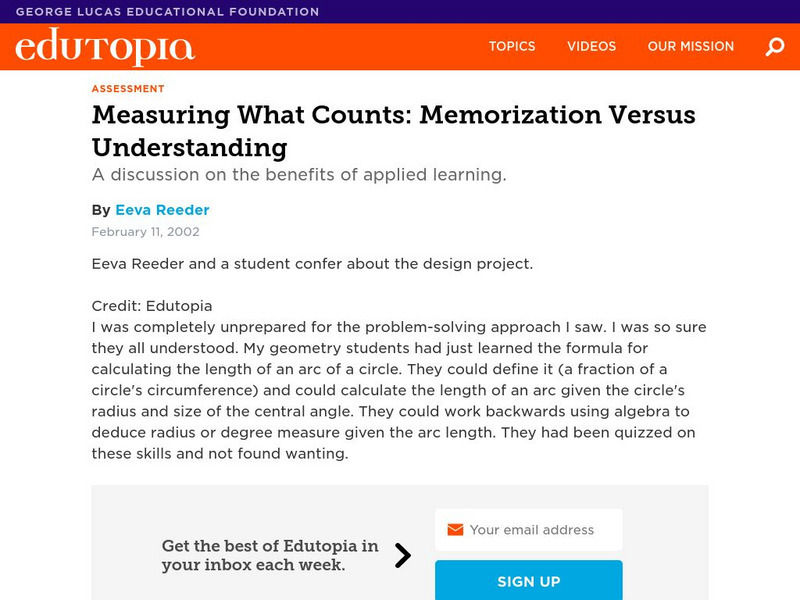Hi, what do you want to do?
New York State Education Department
TASC Transition Curriculum: Workshop 13
The six instructional shifts in this workshop definitely move math and science teachers' understanding of instruction. The workshop, 13th out of a series of 15, asks participants to examine sample tests and to look at how the six...
New York State Education Department
TASC Transition Curriculum: Workshop 7
Designed specifically for math instructors, the seventh workshop of a 15-part series allows time to explore Webb's DOK, ponder open-ended questions, and create lessons to apply what is learned. Teachers craft high-quality math problems...
EngageNY
TASC Transition Curriculum: Workshop 8
Lights, camera, action! Math educators consider how to improve their instruction by examining a model of the five-practice problem-solving model involving a movie theater. Participants examine cognitive demand in relation to problem...
EngageNY
TASC Transition Curriculum: Workshop 15
What do a cheetah, Audi commercial, and air have in common? They're all topics of an engaging inquiry-based, hands-on workshop for educators about background knowledge, reading strategies, the CER model, and argumentative writing. The...
Other
Duke: Center for Inquiry Based Learning
Duke University has established the Center for Inquiry-Based Learning. It serves to enhance math and science lessons. Click on Resources for good examples of Inquiry-based lesson plans.
Other
Rubi Star: Create Rubrics for Your Project Based Learning
RubiStar is a tool that helps teachers develop rubrics. After students have done the project and the rubric has been used to grade it, you can enter the data into RubiStar to determine which items are problematic for the class as well.
Other
What Is Rubistar? How to Make Rubrics
This online tool is designed for teachers to create rubrics that correspond with project-based learning activities.
Other
Edte.ch: Maths Maps
Maths Maps is a collaborative project where participants use Google maps to choose a location within one of the cities highlighted, then create a Math problem about the site. The problems are marked on the map with various colors...
PBS
Wnet: Thirteen: Ed Online: What Do Inquiry Based Lesson Plans Look Like?
Inquiry-based lesson plans are usually referred to as "facilitation plans," to help teachers remember their role as facilitator of learning, rather than fount of all wisdom. The notion also helps teachers structure lessons more loosely...
Buck Institute
Pbl Works: Pbl, Common Core and Next Gen Standards
[Free Registration/Login Required] This two-page article summarizes the alignment of PBL with Common Core standards for ELA and math, plus the Next Generation Science Standards. It is an excerpt from the BIE book, PBL for 21st Century...
Alabama Learning Exchange
Alex: P Hun With Acids and Bases!!! (A P H Lesson)
In this lesson, the students will learn the characteristics of acids and bases including the associated pH values. The students will conduct a hands-on activity that shows color indicators for different pH values. This lesson plan was...
Alabama Learning Exchange
Alex: We Can Dig It!
In this lesson, third grade students will explore "fossils" by using chocolate chip cookies in an interactive fossil dig! Through creative problem-based learning that incorporates technology, students will work in collaborative groups to...
TeachEngineering
Teach Engineering: Energy Systems and Solutions
The Energy Systems and Solutions unit brings students through the exploration of science and engineering concepts as they relate to energy issues in everyday life. Issues surrounding energy production and energy consumption provide a...
Alabama Learning Exchange
Alex: Land Surveying Project
This project resulted from of the collaboration of a computer aided drafting teacher, Chris Bond, and a math teacher, Lee Cable, (Hewitt-Trussville High School) to provide higher math expectations in CT and real life application in...
Alabama Learning Exchange
Alex: Area Model of Multiplication Base 10 Manipulatives
Students will use base 10 manipulatives to build a rectangular array to represent double digit multiplication. Students will make the connection between the standard algorithm and the rectangular array.This lesson plan was created as a...
Edutopia
Edutopia: Measuring What Counts: Memorization Versus Understanding
The author considers a situation from her own math classroom that lead her to re-evaluate her ideas about assessment. She follows with advice for developing what she calls "applied learning" in the classroom.
Alabama Learning Exchange
Alex: Telling Time to the Hour
This lesson helps children make a connection between the digital and analog clock. In general, the number system is based on units of ten which can sometimes make it difficult for children to realize that time is based on cycles of...
Alabama Learning Exchange
Alex: The Clock Tower
This project resulted from the collaboration of a computer aided drafting teacher (pre-engineering), Chris Bond, and a math teacher, Lee Cable, (Hewitt-Trussville High School) to provide higher math expectations in CT and real life...
Alabama Learning Exchange
Alex: The Circles of Life
This is an inquiry based cooperative learning unit that can be used in biology as a graduation exam review or in botany for a nine week project. The learners will learn the life cycle of mosses, ferns, gymnosperms and angiosperms. The...
Alabama Learning Exchange
Alex: The Tennessee Valley Authority and Marshall County
Young scholars will create computer models based both on contemporary maps and primary sources to explore the role of the Tennessee Valley Authority's hydroelectric projects in altering more than 75 miles of the natural landscape and in...
Alabama Learning Exchange
Alex: Decimal War
Learners will use base 10 manipulatives to build models of decimal numbers. Students will compare decimal numbers. This lesson plan was created as a result of the Girls Engaged in Math and Science, GEMS Project funded by the Malone...
Alabama Learning Exchange
Alex: Pass It Down
This lesson, Pass It Down, integrates science and math into two consecutive hands-on genetics activities that should be embedded within an existing genetics unit suitable for biology students. The results of each activity will be...
Alabama Learning Exchange
Alex: Lining Up the Decimals
This lesson provides a chance for the students to order decimals from least to greatest and greatest to least. The numbers are based on a student's ability. This lesson plan was created as a result of the Girls Engaged in Math and...
Alabama Learning Exchange
Alex: Souper Scooper
This hands-on, inquiry based lesson is an extension of the AMSTI Science Module, Solids and Liquids. Young scholars use nonstandard units to measure beans in a soup mix. Students predict how many beans will be in a scoop. Young scholars...









